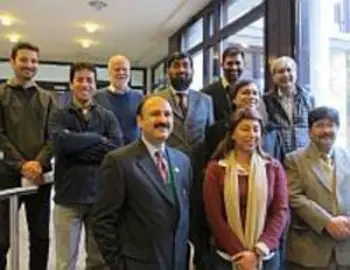German-Pakistani collaboration takes off at ZEF
April 02, 2012.
January 2012. Collaboration partners of two projects within the “German-Pakistani Research Collaboration Program”, initiated and funded by the German Academic Exchange Service (DAAD), have been visiting ZEF. The ZEF-led projects are: “Improving Irrigation Water Use in the Punjab Province of Pakistan by Raising Flexibility and Integrating Surface and Groundwater Resources” and “After the Flood is before the Flood”.
ZEF conducted interviews with four of its new Pakistani partners: Prof. Dr. Niaz Rai, Dean of the Faculty of Agricultural Engineering, University of Agriculture, Faisalabad; Mr. Habib Ullah Bodla, Head of the Monitoring Unit within the Punjab Irrigation and Power Department; Dr. Tasneem Zafar, Economist at the Government College University in Lahore, and Dr. Khalid Manzoor Butt, Head of the Department of Political Sciences of the Government College University in Lahore.
<image style="margin-right: 12px" src="http://www.zef.de/fileadmin/webfiles/downloads/press/pic_newsdoc_paki_0638_135.jpg" align=left>“Our expectations are very high”.
Professor Niaz Rai, Dean of the Faculty of Agricultural Engineering, University of Agriculture, Faisalabad-Pakistan
Facts & figures: The University of Agriculture in Faisalabad has around 12,000 students, of whom 15-20% female. In the Faculty of Agricultural Engineering, around 1,000 students are enrolled. The University has a number of international cooperation partners, but the project “Improving Irrigation Water Use in the Punjab Province of Pakistan by Raising Flexibility and Integrating Surface and Groundwater Resources” is the University’s first German-Pakistani Collaboration. The project is funded by the German Academic Exchange Service (DAAD) and was acquired under the leadership of ZEF alumnus Usman Khalid Awan.
Dear Mr. Rai, what are your expectations of the German-Pakistani collaboration project?
Well, my expectations are very high. The DAAD project is a leading project at our University and a large number of people are involved, from different Faculties and Departments. We will focus on research and training and we plan to engage at least five doctoral students. Our University has cooperation partnerships with U.S.A., Australia, Japan and India. Contacts with China have also been intensified recently. However, the German-Pakistan project on Irrigation Water Use is the first academic collaboration with Germany we have embarked on so far.
What are the benefits for your University from this cooperation with ZEF?
Well, ZEF as an institute has a lot of experience in international research projects. I think we can learn from that. In addition, ZEF brings in technology such as modeling and remote sensing as well as practical experience with these technologies. In the context of this project, we plan to set up a GIS- laboratory (Geographic Information System), which would not have been possible without the project. ZEF has also been working on irrigation issues, and we can complement our research and work experiences in this area.
What is going to be new from an academic point of view in this project?
New for most of our scientists is that we will work in close cooperation with the users, namely the farmers. In addition, the implementation-orientation is new for most of the scientists involved. The overall aim is to increase water productivity and efficiency. We will do this by developing and implementing a concept of demand-driven water supply, which is different from the so-far applied supply-driven irrigation system. We call this new concept “Hydrological Response Unit”, and it is going to be at the core of our research.
<image style="margin-right: 12px" src="http://www.zef.de/fileadmin/webfiles/downloads/press/pic_newsdoc_paki_0641_135.jpg" align=left>“We cannot change everything and too fast”.
Mr. Habib Ullah Bodla, Head of the Monitoring Unit within the Punjab Irrigation and Power Department in Pakistan.
Facts & figures: Pakistan has 21 million acres of agricultural land, and 67% of its population lives in rural areas and from agriculture. Pakistan has the largest integrated irrigated water system in the world. The irrigation system is mainly supply-driven and centrally managed (top-down) from Lahore. Farmers get their water supply based on the size of their land. The current system aims at distributing irrigation water among farmers proportionally.
Mr. Bodla, when the current system is so elaborate and meets the needs of the farmers to a large extent, why should it be changed, as envisaged by the new project you are involved in?
We do not want to change the system completely nor suddenly. We want to monitor the whole process and investigate the impact of the different interventions proposed during the project. What we probably need is a more flexible system of water supply in the end: We want to create more capacities and participation among farmers, and a more sustainable water supply. Our starting point is the farmers and the local water managers.
How can farmers be stimulated and convinced to participate and cooperate in a new system?
Of course, they have to be involved, that is one of the project’s basic ideas. However, we will have to think of incentives. In the end, it is all about increasing farm output and therefore achieving food security for our country and its growing population. One of the consequences of a demand-driven water supply system could be that farmers are stimulated to establish more own water storage options and reservoirs, so they are less dependent on the centrally managed system.
What are your expectations of the project and where do you see the largest benefit?
For us, it is a possibility to develop capacity, in particular in technologies such as remote sensing. In addition, we hope to catch up with global developments in the area of water distribution and management. I think there is still much to learn.
<image style="margin-right: 12px" src="http://www.zef.de/fileadmin/webfiles/downloads/press/pic_newsdoc_paki_0642_135.jpg" align=left>“I am very optimistic about this project and its outcome”.
Dr. Tasneem Zafar, Economist at the Government College University (Faculty of Arts and Social Sciences) in Lahore in Pakistan.
Facts & figures: Dr. Zafar is involved in the project “After the flood is before the flood: Vulnerabilities and coping capacities in flood affected communities of Punjab”. This project is also part of the German-Pakistani collaboration program initiated and funded by the German Academic Exchange Service (DAAD).
Mrs. Zafar, how relevant is this project to the Government College University and its Faculties?
It is very important for us. This is the first cooperation project with Germany - so far we have mainly collaborated with the UK. Three senior members of three of our University’s Faculties are involved in the project so far: Dr. Asir Ajmal, Chairperson of the Department of Psychology, Dr. Khalid Manzoor Butt, Chairperson of the Department of Political Sciences and me, representing the Faculty of Economics. In addition, we will engage up to six students in the course of the project. Of course, we hope to benefit from the international experience of ZEF and from this academic cooperation.
What do you expect as an outcome of this project?
We want to come up with better coping and resilience strategies for flood victims. An important lesson we learned from the past experience with floods in Pakistan is that the extent to which people suffer from the flood and its effects, varies enormously. We can say that natural disasters do not have the same impact on all people, but differ across groups depending on their cultural, political, social and economic opportunities and constraints. Our goal is to achieve more equitable opportunities in terms of building coping capacities for all victims.
Will it be easy to put academic advice into the right political channels up to even implementation?
During this project, we will involve numerous stakeholders, starting from local citizens and government units up to the national political level. Of course, we will need input and support from all levels to be able to implement our concepts. In the end we have the same goal: We want to improve coping and preparedness strategies for floods among the population affected. Thus, I am optimistic about our prospects.
<image style="margin-right: 12px" src="http://www.zef.de/fileadmin/webfiles/downloads/press/pic_newsdoc_paki_0714_135.jpg" align=left>"Implementation-oriented research is something new for Pakistan".
Dr. Khalid Manzoor Butt, Head of the Department of Political Sciences of the Government College University in Lahore.
Facts & figures: The GCU has around 6,000 students. The Department of Political Sciences has around 400 students and 15 senior staff members.
How did the cooperation between ZEF and GCU come to existence?
Well, ZEF was looking for partners for their project “After the flood is before the flood” in Pakistan. We are the oldest public college in Pakistan, founded in 1864, but with a modern touch such as, for example, co-education. We received University states only recently. Anyhow, we were visited by the ZEF-delegates as well. Our set-up must have been convincing, although this is the first international collaboration with a German partner institute for our University.
What is so special about the set-up of your university and department?
The unique thing for Pakistan about our way of conducting research is that we work implementation-oriented. I did, for example, my own doctoral research on child labor in Pakistan. I based my findings on primary data, namely surveys among children and stakeholders, which I carried out myself. This was uncommon in Pakistan and even at the GCU, where I did my PhD research and received my doctoral degree.
What are your expectations of the cooperation with ZEF?
In the first place we want to set up a program that will help people to cope better with the occurrence and the impact of natural disasters such as floods. Of course, we also hope that this collaboration will bring an institutional and academic boost to the social sciences in our Faculty. I am sure that both sides can benefit from the exchange of ideas, concepts and practical experiences.
All interviews were conducted by Alma van der Veen



